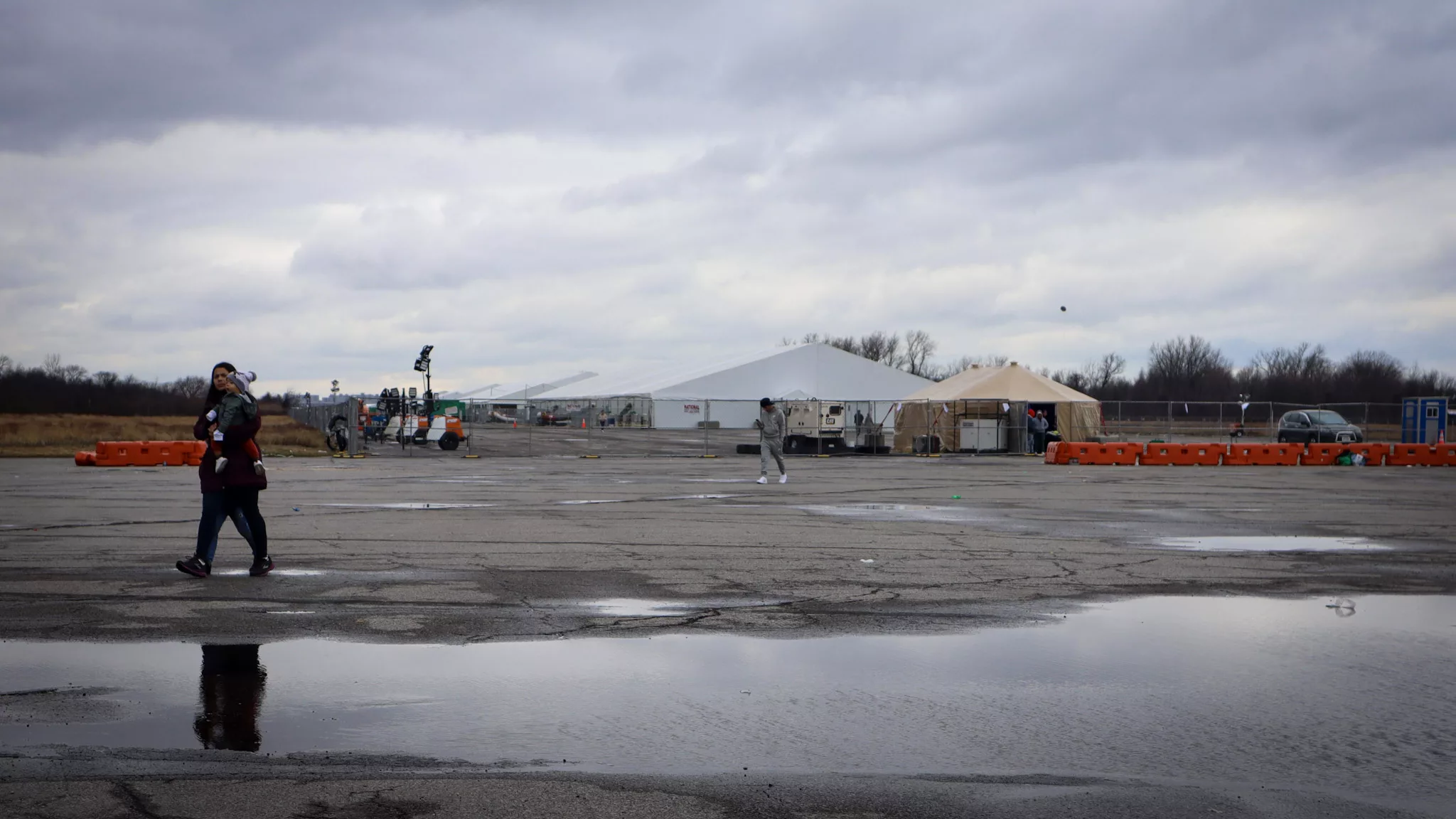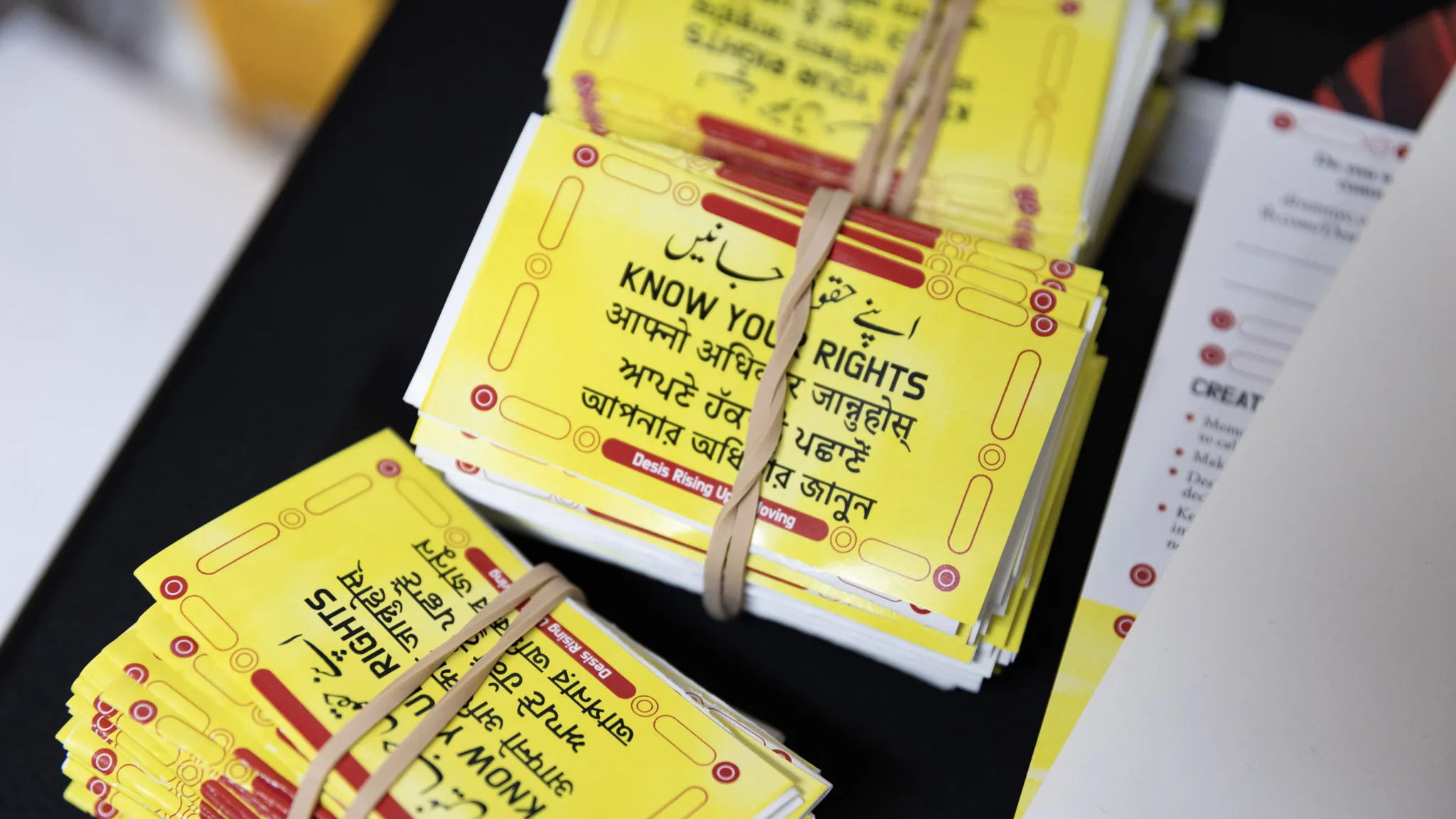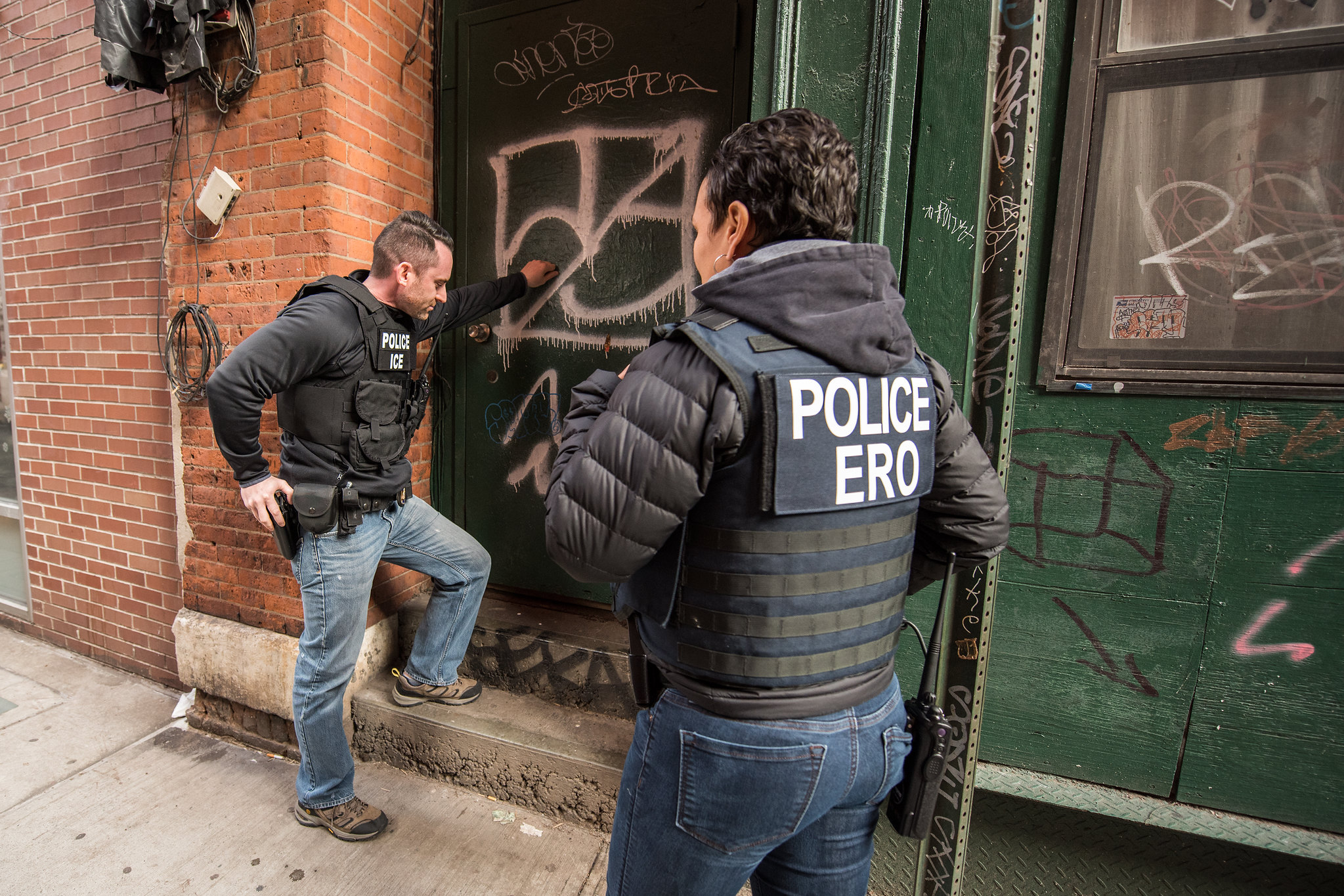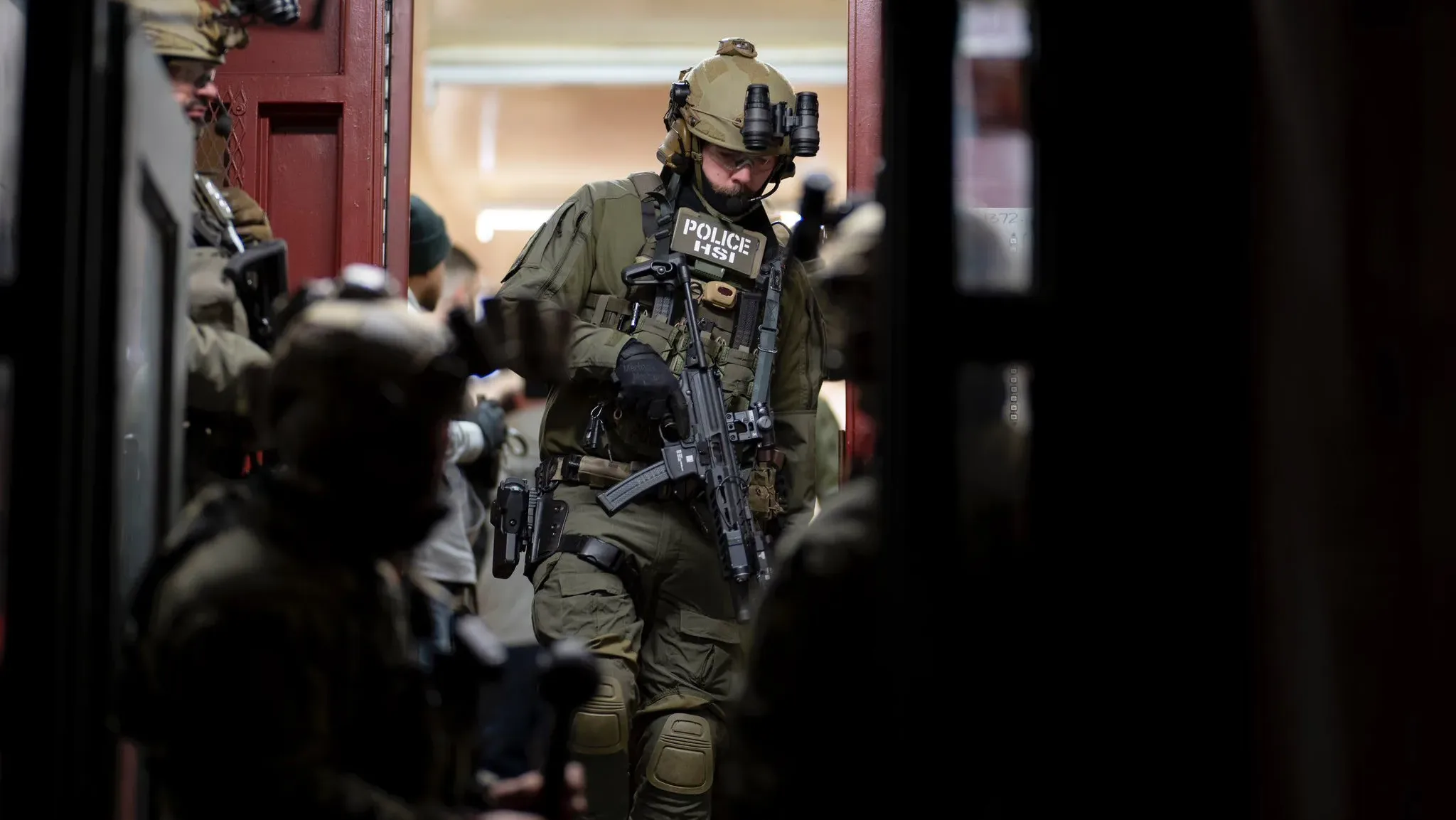The Floyd Bennett Field tent site has become a symbol of blight for New Yorkers opposed to providing shelter for the tens of thousands of migrants who have arrived here in recent years. On online forums, they argue for hours, blaming residents of the shelter for a rise in petty crime in the area and an increase of people asking for money on the street.
In interviews this week at Floyd Bennett Field, migrants, speaking in Spanish, said they do travel the area asking for work, but the isolation of the facility is in part preventing them from finding full time jobs and becoming fully self-sufficient.
The facility is several miles away from the closest subway stop, and it can take hours to take children to and from school. Inside, some migrants said they sleep in their winter clothes to protect them from the cold, and storms have forced them to rush out of the site at the last minute and seek alternate shelter. The remoteness of the site prevents many from leaving and securing employment and housing, their ultimate goal.
“They brought us here because there was no other site, and since there was no more space, what were we going to do?” said Carmen, a migrant from Venezuela who only gave her middle name and lives at Floyd Bennett Field with three others in her family. “It was either this, or staying out on the street with this cold.”
Also Read: “I Felt Like I Was Going to Die Here,” Migrants Evicted from NYC Shelters Face Dangerous Cold
The city has faced pushback from residents, immigrant advocates, and politicians on all sides of the political spectrum for setting up a migrant shelter at Floyd Bennett Field. Some local residents have often complained on Reddit threads and Facebook groups about the facility and the migrants who live there. Lawmakers filed a lawsuit last year in the State Supreme Court to stop the shelter from opening. New Yorkers have protested near the site several times since the city announced its opening.
New York City is currently in a lease agreement with the federal government in order to house migrants at the site, which was previously a naval air station and is currently managed by the National Park Service.
Housing nearly 2,000 migrants — all families with children — the site has become a flashpoint for the migrant humanitarian crisis, with some residents complaining that migrants have allegedly been asking for money in the surrounding areas, including knocking on doors requesting food and financial assistance. Immigrant advocates have called the site unsafe, especially for children, pregnant women, or individuals with disabilities. The facility is made up of several tents, which consists of hundreds of makeshift compartment-like rooms with cots.
“This is not, you know, the best conditions, but we’re managing a crisis,” Mayor Eric Adams said in a November video posted on X, speaking from the Floyd Bennett Field shelter. “We can’t say it any better: we need help.”
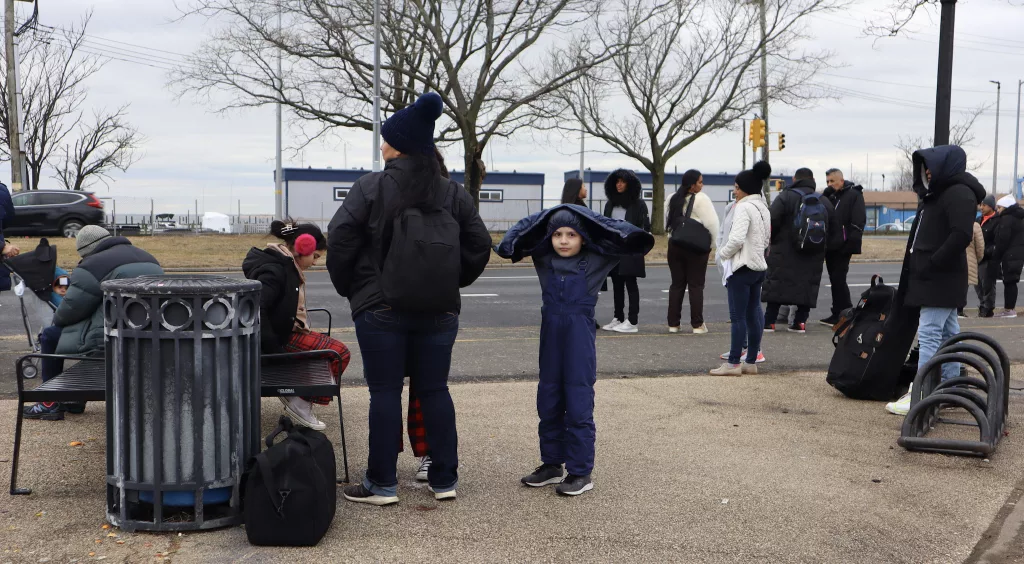
Three weeks ago, the shelter received national attention when heavy rain and high winds led city emergency management officials to evacuate the facility and relocate the approximately 2,000 migrants to the James Madison High School gym in Midwood overnight over concerns about how the structure would fare in those conditions. Though migrants left on buses back to Floyd Bennett Field in the early hours of the morning the following day, the school went remote the following day. Backlash followed from residents about the cancellation of in-person classes — with a bomb threat even called into the school the following day — and some migrants said the experience made them fearful of their living conditions.
Last week, a small group of elected officials stood outside the tent shelter, rallying for the closure of the shelter at Floyd Bennett Field. Republican Congress Member Nicole Malliotakis led the calls to shut down the shelter, along with a group of bipartisan politicians including New York State Assembly Member Jaime Williams (D-Brooklyn) and Queens Council Member Joann Ariola (R-Queens).
Migrants told Documented that sometimes they searched for employment at the nearby Kings Plaza Shopping Center and the surrounding areas in Marine Park and Mill Basin, but had been largely unsuccessful. Documented reporters did not witness any migrants asking for financial help in the nearby neighborhoods on Monday.
Many migrants said they were looking for housing assistance just until they could gather enough money to pay rent and leave the system. All of them had children, from babies in strollers up to teenagers attending Brooklyn high schools. Some families were on their way out of the shelter on Monday, lugging their suitcases onto MTA buses as they had reached their 60-day limit, and were headed to the Roosevelt Hotel in Midtown to reapply for shelter.
“I am very grateful,” said Luis Lopez, 41, a father from Riobamba, Ecuador whose family was evicted from Floyd Bennett and was making his way to a bus with his wife, children, and all their belongings on Monday. Their goal had been to become independent in 60 days, but they hadn’t been able to find an apartment in time, he said. “The state, the government, did us a big favor and provided us with everything necessary,” Lopez said. “They were people with big hearts.”
Although many migrants were thankful to have a place to sleep, they said the lack of infrastructure amidst the dropping temperatures and wind felt unstable. Some migrants said they often wore winter clothes inside to shield themselves from the gusts and the cold that crept into the tents.
“I have to go to those in charge, because sometimes they don’t turn on the heat,” said Carmen, from Venezuela. When the heat is not on, “you have to be like this,” she said, gesturing to the heavy winter coat she was wearing outside: “Wearing a jacket, with a hat and everything on inside.”
To shower and use the bathroom, families have to exit the main tents and go outside to trailers, which are often dirty, said Luisa Ramos, a migrant mother from Colombia who has lived at the shelter with her husband, Alex Villalobos, and their 10-year-old son, for about 20 days. The family did not want to be a burden to the government, they said — so they often spent their time in the surrounding area, including at the Kings Plaza mall, looking for work. “You go around asking,” Ramos said as she walked from the tents to the nearby bus stop. But the family had no luck yet with finding employment. “At least we have cots,” she said.
They were thankful for the assistance they had been given, but life at the shelter in Floyd Bennett Field was not what they had expected, the family said. “It’s definitely different. We had another perspective,” Villalobos, the husband, said. “Well, the American dream.” Ramos added: “It’s a lot harder than you think it’s going to be.”
On Monday, several migrant families left the shelter with luggage in tow, and children by their parents’ side, on the way to the Roosevelt Hotel to reapply for shelter after they reached their 60 day limit at Floyd Bennett – though some said they were given extensions. The trip likely takes more than an hour, and requires transfers from bus to subway lines.

Margarita Diaz, whose husband Luis Lopez expressed a deep gratitude to the local government for their help, seemed more worried about what the future looked like for her family as they made the walk in harsh winds from the tents to the public bus stop with her daughter, 11, and son, 16, rolling their suitcases. They would take several buses and trains across boroughs Monday, coming back to Brooklyn later that day to pick up their six-year-old daughter who was in school. “We’re pulled here, we’re pulled there,” Diaz, 39, said. “It’s difficult. It’s not like being in just one place. And now we’re leaving once again, with our things. Very hard.”
The location of the site has made it hard for some families to find work and take their children to school. Guscary Garcia, who lives at the shelter with her three children – ages 12, 10, 8 — has to wake up every morning at 5 a.m. to accompany her children to Coney Island, where they were enrolled in school. In the afternoon, she makes the journey again to pick them up. It’s unclear to her why the children were enrolled in school so far from the shelter, but she says about 50 children from the shelter are now in school there.
Her husband used to live at the shelter with the family but was unable to secure employment, so he left the state completely. He’s now in Miami, where he has a job lined up, but Garcia stayed alone with her children at Floyd Bennett. “In reality, at least we have a roof over our heads,” she said. “These are opportunities that you cannot waste.”
